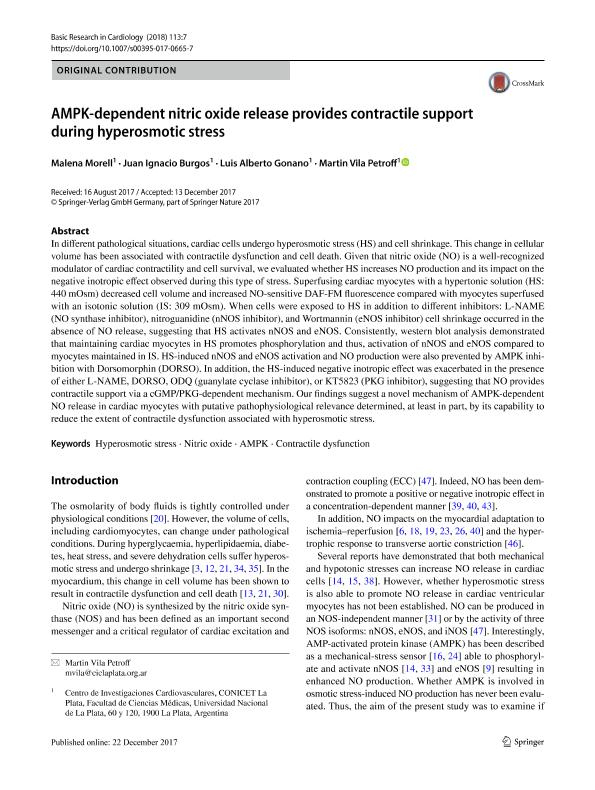Artículo
AMPK-dependent nitric oxide release provides contractile support during hyperosmotic stress
Fecha de publicación:
01/2018
Editorial:
Dr Dietrich Steinkopff Verlag
Revista:
Basic Research In Cardiology
ISSN:
0300-8428
Idioma:
Inglés
Tipo de recurso:
Artículo publicado
Clasificación temática:
Resumen
In different pathological situations, cardiac cells undergo hyperosmotic stress (HS) and cell shrinkage. This change in cellular volume has been associated with contractile dysfunction and cell death. Given that nitric oxide (NO) is a well-recognized modulator of cardiac contractility and cell survival, we evaluated whether HS increases NO production and its impact on the negative inotropic effect observed during this type of stress. Superfusing cardiac myocytes with a hypertonic solution (HS: 440 mOsm) decreased cell volume and increased NO-sensitive DAF-FM fluorescence compared with myocytes superfused with an isotonic solution (IS: 309 mOsm). When cells were exposed to HS in addition to different inhibitors: L-NAME (NO synthase inhibitor), nitroguanidine (nNOS inhibitor), and Wortmannin (eNOS inhibitor) cell shrinkage occurred in the absence of NO release, suggesting that HS activates nNOS and eNOS. Consistently, western blot analysis demonstrated that maintaining cardiac myocytes in HS promotes phosphorylation and thus, activation of nNOS and eNOS compared to myocytes maintained in IS. HS-induced nNOS and eNOS activation and NO production were also prevented by AMPK inhibition with Dorsomorphin (DORSO). In addition, the HS-induced negative inotropic effect was exacerbated in the presence of either L-NAME, DORSO, ODQ (guanylate cyclase inhibitor), or KT5823 (PKG inhibitor), suggesting that NO provides contractile support via a cGMP/PKG-dependent mechanism. Our findings suggest a novel mechanism of AMPK-dependent NO release in cardiac myocytes with putative pathophysiological relevance determined, at least in part, by its capability to reduce the extent of contractile dysfunction associated with hyperosmotic stress.
Palabras clave:
AMPK
,
CONTRACTILE DYSFUNCTION
,
HYPEROSMOTIC STRESS
,
NITRIC OXIDE
Archivos asociados
Licencia
Identificadores
Colecciones
Articulos(CCT - LA PLATA)
Articulos de CTRO.CIENTIFICO TECNOL.CONICET - LA PLATA
Articulos de CTRO.CIENTIFICO TECNOL.CONICET - LA PLATA
Articulos(CIC)
Articulos de CENTRO DE INVEST.CARDIOVASCULARES (I)
Articulos de CENTRO DE INVEST.CARDIOVASCULARES (I)
Citación
Morell, Malena; Burgos, Juan Ignacio; Gonano, Luis Alberto; Vila Petroff, Martin Gerarde; AMPK-dependent nitric oxide release provides contractile support during hyperosmotic stress; Dr Dietrich Steinkopff Verlag; Basic Research In Cardiology; 113; 7; 1-2018; 1-11
Compartir
Altmétricas




